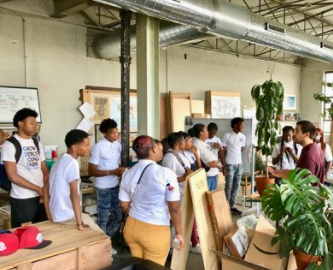Creating an Entrepreneurship-focused Micro Charter in Detroit
Key Takeaway: “Small by design” – a micro school’s small size allows school staff to deliver student-centered, customized learning.
 “It goes back to when I was 8 or 10 years old. I’ve always had a passion for the environments that people learn in. So instead of playing video games, or sports, or things with my friends, I would fill up notebooks with designs for fictional schools that I wanted to open,” explains Drew Schantz about the origin of his dream to open a charter school.
“It goes back to when I was 8 or 10 years old. I’ve always had a passion for the environments that people learn in. So instead of playing video games, or sports, or things with my friends, I would fill up notebooks with designs for fictional schools that I wanted to open,” explains Drew Schantz about the origin of his dream to open a charter school.
Schantz is the Founder and Executive Director of VentureSchool, a micro charter high school that is in the planning and charter application process in Detroit, Michigan. Once approved and operating, the charter school will focus on building entrepreneurial skills, along with rigorous personalized academics and a school culture based on restorative justice.
VentureSchool leaders are currently living the innovative spirit they hope to instill in students by running VentureLabs, a series of pop-up classrooms.
The pop-up concept is known in the food industry: restaurateurs will create a food truck or mini restaurant in another space to test out their menu. Similarly, VentureLabs programming enables VentureSchool leaders to test pieces of their curriculum and gather feedback from students, parents, and community stakeholders on how to best meet their needs. VentureLabs covered topics like Intro to Entrepreneurial Thinking, Understanding & Identifying Opportunities for Innovation, and Prototyping and Learning from Failure.
The entrepreneurship curriculum that is being developed in VentureLabs will be a foundation for VentureSchool lessons and projects. A core idea for VentureSchool is that students will be challenged and supported to create their own for-profit or non-profit venture during their high school experience.
The micro school format will help VentureSchool educators provide individualized instruction to help their students succeed at launching a business, as well as academic achievement.

A micro school is small by design. In VentureSchool’s case, the leadership team plans to open the charter school in Fall 2018 and hopes to serve 50-60 students in ninth grade. The school will add a grade each year, serving approximately 200 high school students at full enrollment. Schantz and the VentureSchool team believe the small total enrollment, coupled with four instructors per grade level, will give the personalized attention needed to get students on and beyond grade level academic proficiency while building an entrepreneurial mindset.
VentureSchool still has several hurdles it needs to clear before opening. The leadership team is looking for an authorizer. It is also fundraising to subsidize its planning years and first year of operation because of the proportionally low per-pupil funding that comes with a micro school. Still, VentureSchool is well on its way toward its mission to “create a revolutionary new school model that prepares all students to become capable, curious, and courageous leaders, innovators, and agents of change in their community.”
To learn more about VentureSchool, visit its website and check out the Detroit Daily podcast interview with Drew Schantz.
Image Credit: VentureSchool
